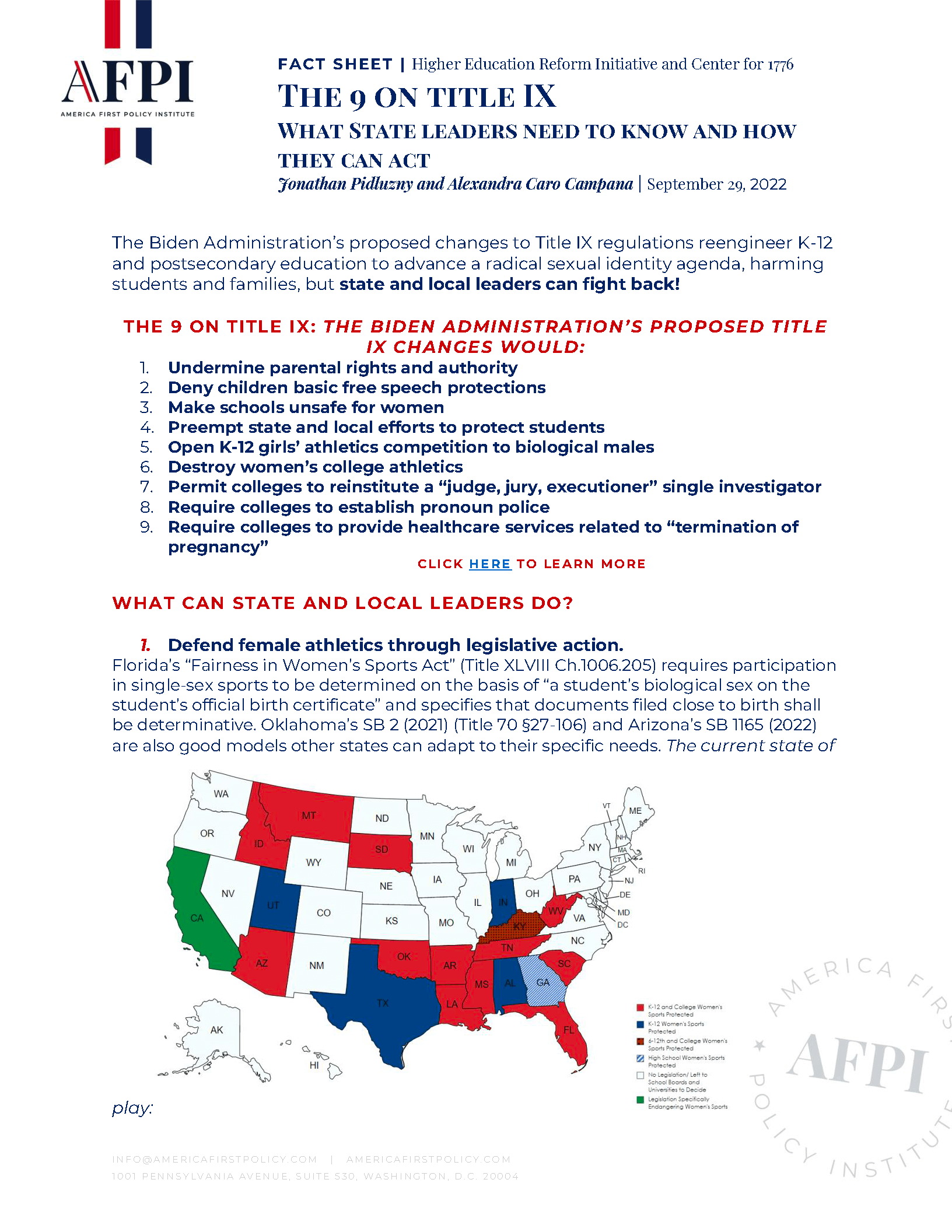Fact Sheet: The 9 on Title IX: What State Leaders Need to Know and How They Can Act
The Biden Administration’s proposed changes to Title IX regulations reengineer K-12 and postsecondary education to advance a radical sexual identity agenda, harming students and families, but state and local leaders can fight back!
THE 9 ON TITLE IX: THE BIDEN ADMINISTRATION’S PROPOSED TITLE IX CHANGES WOULD:
1. Undermine parental rights and authority
2. Deny children basic free speech protections
3. Make schools unsafe for women
4. Preempt state and local efforts to protect students
5. Open K-12 girls’ athletics competition to biological males
6. Destroy women’s college athletics
7. Permit colleges to reinstitute a “judge, jury, executioner” single investigator
8. Require colleges to establish pronoun police
9. Require colleges to provide healthcare services related to “termination of pregnancy”
What Can State and Local Leaders Do?
1.Defend female athletics through legislative action.
Florida’s “Fairness in Women’s Sports Act” (Title XLVIII Ch.1006.205) requires participation in single-sex sports to be determined on the basis of “a student’s biological sex on the student’s official birth certificate” and specifies that documents filed close to birth shall be determinative. Oklahoma’s SB 2 (2021) (Title 70 §27-106) and Arizona’s SB 1165 (2022) are also good models other states can adapt to their specific needs. The current state of play:

2. Protect students from radical gender ideology by school board action while the Biden Administration rulemaking unfolds.
A resolution introduced in Ohio’s Board of Education reminds public school officials that the Biden Administration’s radical rule has not been finalized. It may never be. Until the rulemaking process concludes, the Trump Administration regulation remains in effect. The school board resolution, therefore, requires the State Superintendent of Public Instruction to issue a letter notifying every elementary and secondary school that received public funding that the Ohio Department of Education “considers the applicable [federal] guidance documents as without legal force and effect and, therefore, non-binding and unenforceable at this time.”
3. Codify parental rights by formal state legislation.
State legislators can introduce bills designed to protect parents’ rights in education. Georgia’s HB 1178 specifically affirms that “All parental rights are reserved to the parent of a minor child... without obstruction or interference from a state or local government entity,” including the specific rights to “direct the upbringing and the moral or religious training of [minor children]” and to “review all instructional materials intended for use in the classroom of his or her minor child.” Arizona HB 2161 and Florida HB 1157 also provide strong models for state legislatures around the country.
4. Develop model school policies at the state level to help local schools navigate issues related to gender identity.
Virginia’s Department of Education has released a model policy to provide guidance to Virginia schools and school boards. The document asserts important guiding principles, beginning with “Parents have the right to make decisions with respect to their children.” The policy also requires schools to defer to parents “to make the best decisions with respect to their children” and “keep parents informed about their children’s well-being,” which is compatible with showing “respect [for] all students” and ensuring harassment and bullying are not tolerated. The model policy considers existing statutory requirements and legal judgments that allow Virginia schools to “separate their sports teams on the basis of sex” and only permit children who live with both parents to change their names “upon the application of a parent.”
5. Support policies that protect students’ due process rights in higher education.
The Biden Administration’s proposed revision to Title IX regulations will significantly weaken federally required minimum due process protections for students accused of sexual misconduct, allowing universities to revert to many of the failed practices of the Obama era. Florida House Bill 233 (2021) requires state colleges and universities to extend the following specific guarantees to students and to publish them on the institution’s website: “timely written notice [of the] alleged violation,” “the right to a presumption that no violation occurred,” “the right to an impartial hearing officer,” “the right to an advisor or advocate,” “the right to appeal,” opportunity to question witnesses, and access to “all known information relating to the allegation.” Several other states have passed similar legislation, including Arkansas HB 1892 (2015), Kentucky HB 2090 (2022), and Louisiana HB 364 (2022).
More Resources
July 06, 2023
AFPI Leads the Charge in Most Historic Year for School Choice Progress
At the America First Policy Institute (AFPI), we believe that the transformative progress on school choice will help prepare Americans for the rights and responsibilities of citizenship.
April 04, 2023
FACT SHEET: Colorado HB23-1003 Gives Parents Less Control Over Their Child’s Education
“I do not believe in co-parenting with the government, and I never will. Parental rights are a God-given blessing. I am deeply saddened to see our country even debating who should…
March 24, 2023
